They are each other’s opposites. Still, on a joint mission to change the world. How did a serial entrepreneur from Varberg on the West Coast of Sweden and a PhD/Senior Lecturer in machine learning in Sweden’s rainiest city Borås, come up with the mission to develop a de-facto-standard for making connected things smart and how does that align with a sustainable future?
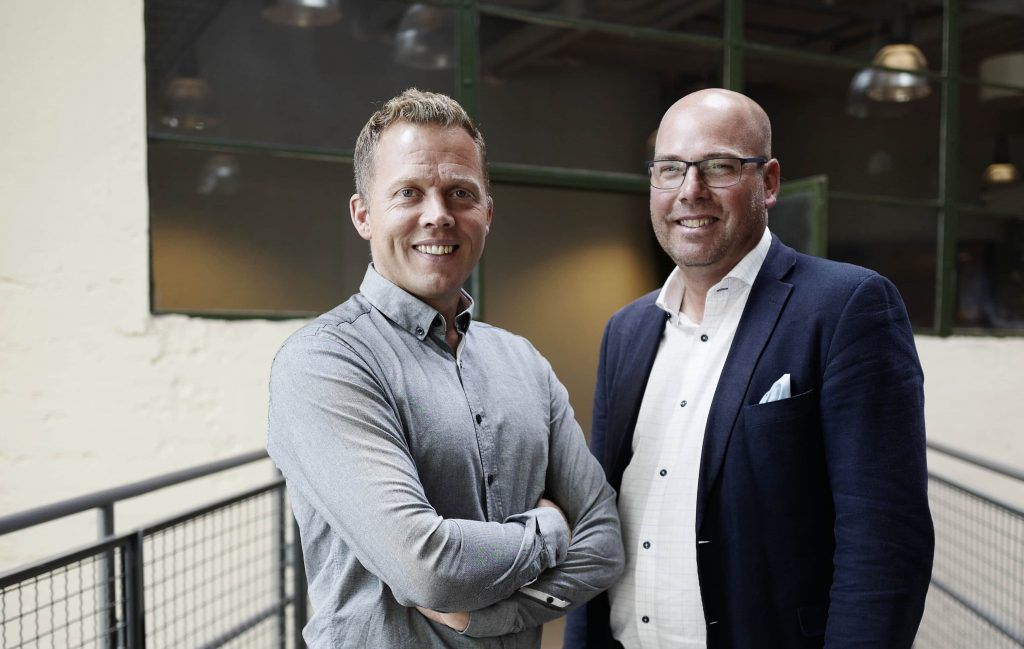
Rikard König, CTO Ekkono, and Jon Lindén, CEO Ekkono
If you’re going to do something, do it big!” That is a statement both Rikard König and Jon Lindén agree on, but when they met in 2015, they had no idea that they five years later would be running one of the most promising IoT startups in the world. Because that is what Ekkono is, a Swedish startup built on many years of university research on machine learning. And not just any machine learning, but the state-of-the-art technology of putting the intelligence on the edge. Still in the stage of “promising”, because as any other startup, the high risk of being a pioneer cannot be anything else
Early on Machine Learning
We need to go back in history, to the 80’s and a mid-sized town outside Gothenburg, to understand how it all started. Rikard König, born and raised in Alingsås, became interested in programming at an early age and started out experimenting building his own computer games. His hobby turned into an education in System Architecture at the University of Borås in the 90’s and later a PhD position, looking into machine learning and algorithm development in the beginning of the 21st Century. His great passion for AI led Rikard into cutting-edge knowledge in optimization of predictive models, and later what we now know as machine learning.
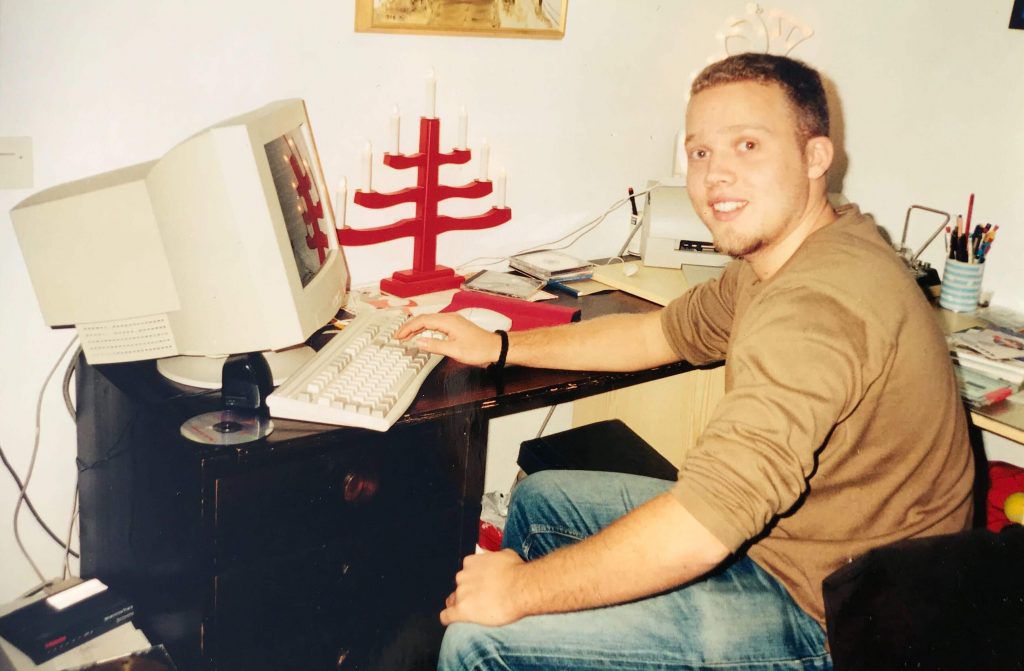
Rikard König in his early years During his research
Rikard got to apply his research on a wide range of areas, e.g. campaign predictions for ICA, modeling the driver’s influence on fuel consumption for Scania’s trucks, and how to combine high speed video with machine learning to get automated and personalized instructions to golf players using TrackMan radar data. However, he never saw himself as a “typical researcher”, meaning that he liked the applied side of research more than the theoretical and always planned to use his research in the “real world” after his PhD to make a real difference. Rikard started to develop a small and efficient machine learning library based on his findings. The product slowly took form but he struggled to pinpoint the best business case. In 2015 Rikard received a grant from Chalmers Innovation Office for commercialization of research. That is when Jon Lindén came along.
Born Tech-Entrepreneur
Jon Lindén grew up with a huge interest in technology. When his friends started playing computer games, his father gave him one for programming. At the age of 18 he got his first job at a pre-printing company and was soon delegated to digitize parts of the company, to what later became a whole multimedia and Internet department. After that mission he decided to travel around the US and ended up landing a job for the Swedish Trade Council (current Business Sweden) in Chicago. Jon returned to Sweden in 1999, in the middle of the happy IT era, where he couldn’t keep himself from starting his own business. It was all happy days with venture capital flowing into startups and his new venture Skolboken.se AB (TheSchoolbook.com), an online procurement service for F-12 educational material, had great success. Then came the Dot-com crash in 2000 and it was time to take the learnings from putting a company into bankruptcy and do something else.
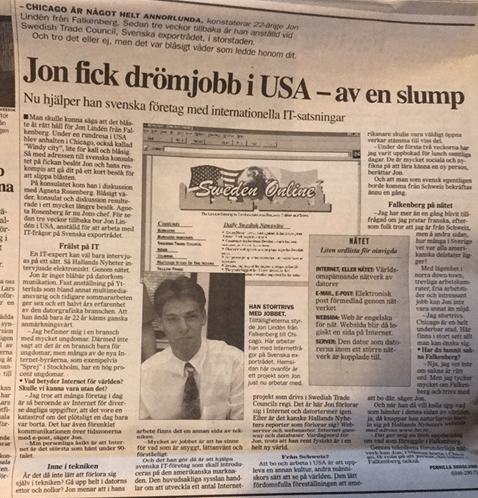
Jon Lindén at is first job in Chicago
First Startup Journey
Living in Stockholm in the beginning of the millennium, Jon was contacted by the founders of Procera, a provider in network intelligence equipment, and who at that time operated from Jon’s hometown, Falkenberg. They were just in the beginning of building the business and wanted Jon onboard. Said and done, he joined as co-founder and started the journey of building an idea to what later became a global leader in DPI (Deep Packet Inspection), listed on the New York Stock Exchange and Nasdaq. Jon’s role at Procera went from marketing, to strategy, to General Manager for Europe and Chief Strategy Officer world-wide. In 2014, after 13 years with the company, he wanted to do something else. Among his consulting assignments was the one for the University of Borås and Rikard König for a project on commercialization of research.
Commercializing Cutting-Edge Knowledge
So the researcher and the entrepreneur met, and if anything can illustrate the saying “When opposites attract”, this was the moment. When Rikard started talking about algorithms, machine learning, AI, small and effectiveness, Jon saw the potential with his history in telecom, where operators talk of nothing other than IoT. What if they could use Rikard’s cutting-edge knowledge in prediction with incremental learning by putting the intelligence on small, connected devices to make them smart? Jon had been in the telecom industry from the rise of the smartphone, experiencing the addition of apps, sensors and other features that required a lot of bandwidth. If they could push the intelligence to run onboard the device, it would reduce network load by sending smart insights instead of raw sensor data. They also came to the conclusion that the technology would be more interesting for product OEM:s than the network operators.
Rikard and Jon decided to give it a serious go and brought Anders Alneng along, with his many years of B2B customer and sales experience, and Joakim Andersson with a broad tech expertise, both former Procera colleagues to Jon. All four founders live in different cities and work discussions were mainly done late nights over Skype after putting the kids to bed. They started outlining a business plan and filled it with content, based on the outcome of Rikard’s research. According to themselves they “played company” – with no product, no money, no employees and no customers, but a Powerpoint vision. They started to add the embryo to a product and found a friendly company to be the first customer (Systeminstallation in Varberg). Ekkono was incorporated in late 2016 with a small office in Träslövsläge outside Varberg.
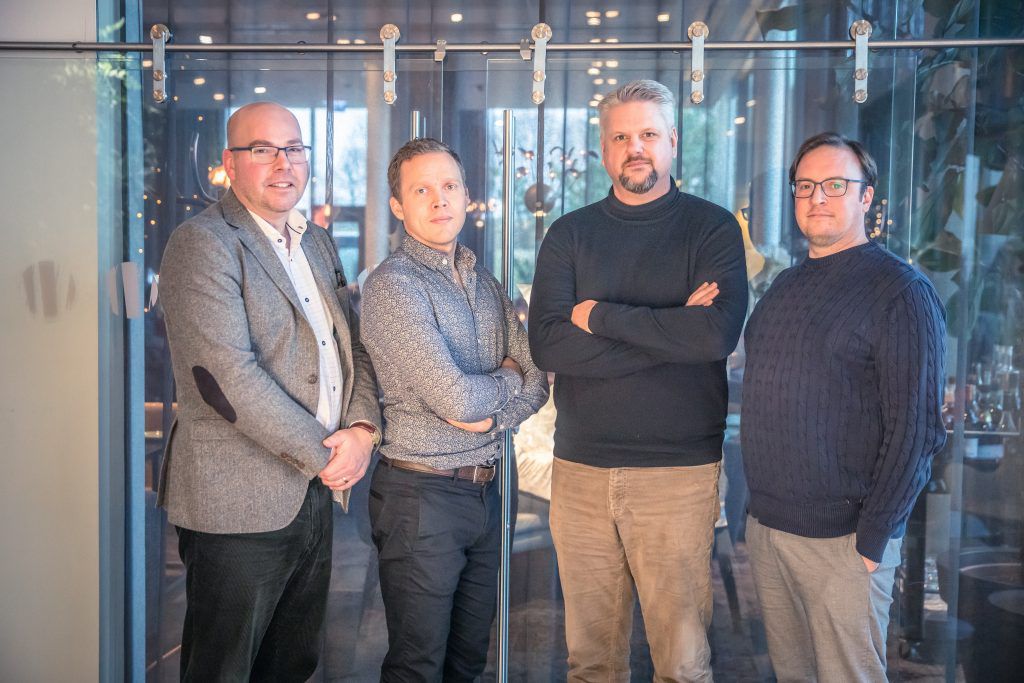
Ekkono’s founders: Jon Lindén, Rikard König, Anders Alneng and Joakim Andersson
Edge Machine Learning on the Market
With a concept and an emerging product, using their own money for funding, they started talking to potential customers and tested the edge machine learning software on a housing automation project. Not too long thereafter, Alfa Laval heard about the startup in Varberg and wanted to test the product for predictive maintenance on their heat exchangers. Ekkono launched the first data trial with Alfa Laval in 2017 and deployed a pilot. Around the same time the first funding round closed, welcoming Walerud Ventures and Almi Invest into the Ekkono Family. The solution with Alfa Laval later went live in 2019, when Ekkono also raised a post-seed round led by the Swedish family office Lindeblad Venture. By now it was a real company, with eleven employees and a second office in Borås.
Making Connected Things Smart
So, what happens when a researcher who wants to use his findings in the real world, meets an entrepreneur with a wide imagination and a lot of experience of starting successful tech companies from scratch? You get a decent-size of a company with cutting-edge technology, on a mission to make their software the de facto standard for making connected things smart, in just a few years. Today the team consists of 23 employees with multiple data science PhDs, world-class software developers, and former CTOs from Tele2 and Carmenta. Customers include ABB, Volvo, Siemens, Husqvarna and Sandvik and recently Ekkono was listed as the most promising Swedish IoT company by Red Herring Europe and received Gold in German Innovation Awards.
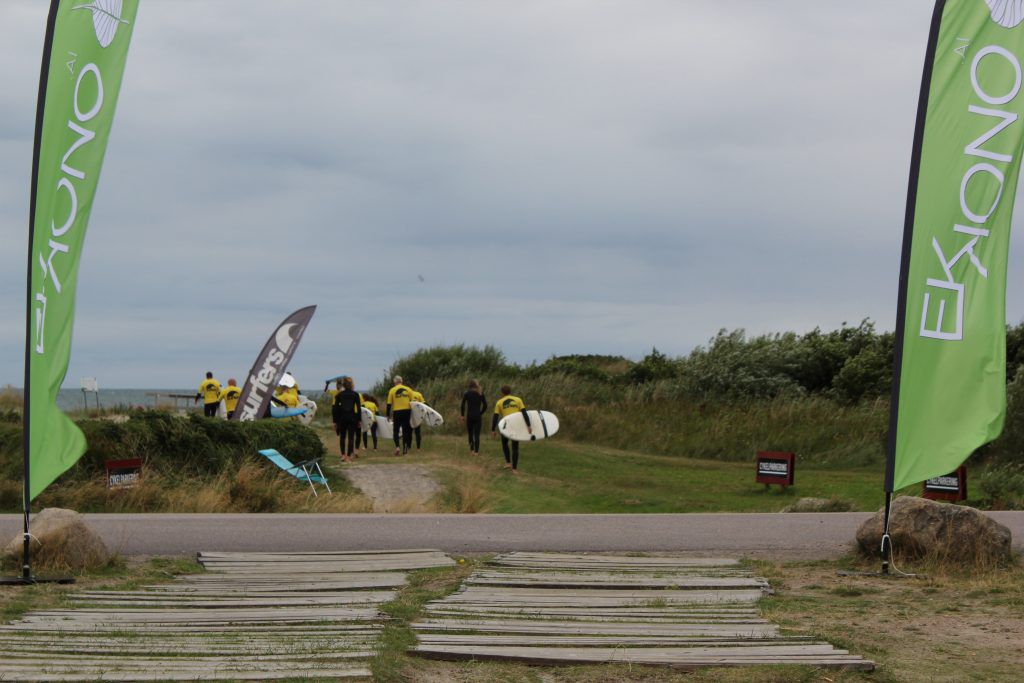
Ekkono Team Surfing in Varberg
Ekkono is a virtual born company from start, none of the four founders are based in the same city, and when Covid-19 hit the world in the beginning of 2020, Ekkono was prepared. No one could see a pandemic coming, but entrepreneurship means agile adoption of constantly changing conditions, so Ekkono stands strong with the mission intact.
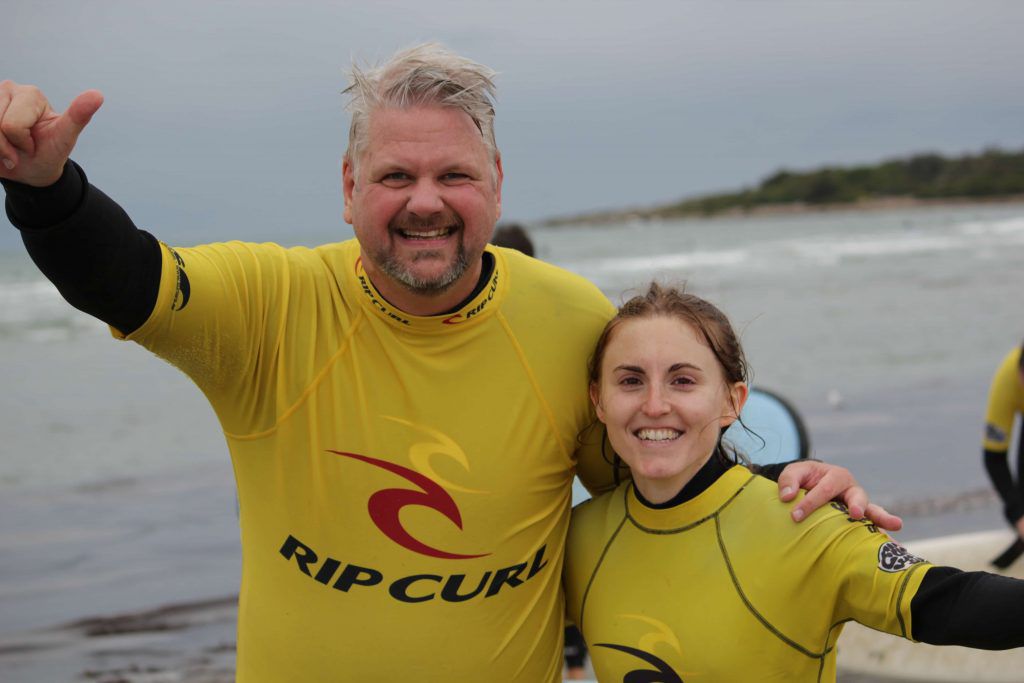
Anders Alneng, VP of Sales, and Eva Garcia Martin, Data Scientist specialized in Energy Efficient Algorithms
Groundbreaking Tech and a Kick-Ass Team
What are the learnings of building a startup from scratch on cutting-edge research? If you ask Rikard, he would say that first of all, he finally gets to do real good with his research. After testing numbers of applications, he found the one when meeting Jon, hearing about IoT. He would also say that running a company is a lot more fun than only working in the academic world.
I was surprised by how positive everyone is in the startup world. When you come from academia like me and are used to seeking for mistakes and errors, it was a huge transition to be around people who rather encourage mistakes to learn from them. If you don’t try a hypothesis in reality, how will you know if it works or not?
Jon, on the other hand, was surprised when he met Rikard and saw a funny, down to earth, positive and curious guy, and not a boring professor, in a very technical area of research. He would also say that both Rikard, the other founders and all employees complement each other.
In my professional life, I have recruited people in all areas of expertise, all ages and all over the world. I know that it takes different types of people and personalities to build a successful company. I sometimes stop and look at all Ekkonians*, whether it is in a physical room or in a digital meeting, and I feel such pride over what we have become in such a short amount of time. At the same time I’m an impatient entrepreneur and time optimist that needs a reminder every now and then of what Bill Gates said: “Most people overestimate what they can do in one year and underestimate what they can do in ten years.” So think about what we will be in another five or ten years! Building a company is all about a decent idea, hard work, more hard work, and quite a bit of luck. Ekkono and its groundbreaking technology is in the eye of the storm of technical development when more and more things get connected. I see no limit in how big this can become. This is my Google-size of opportunity!
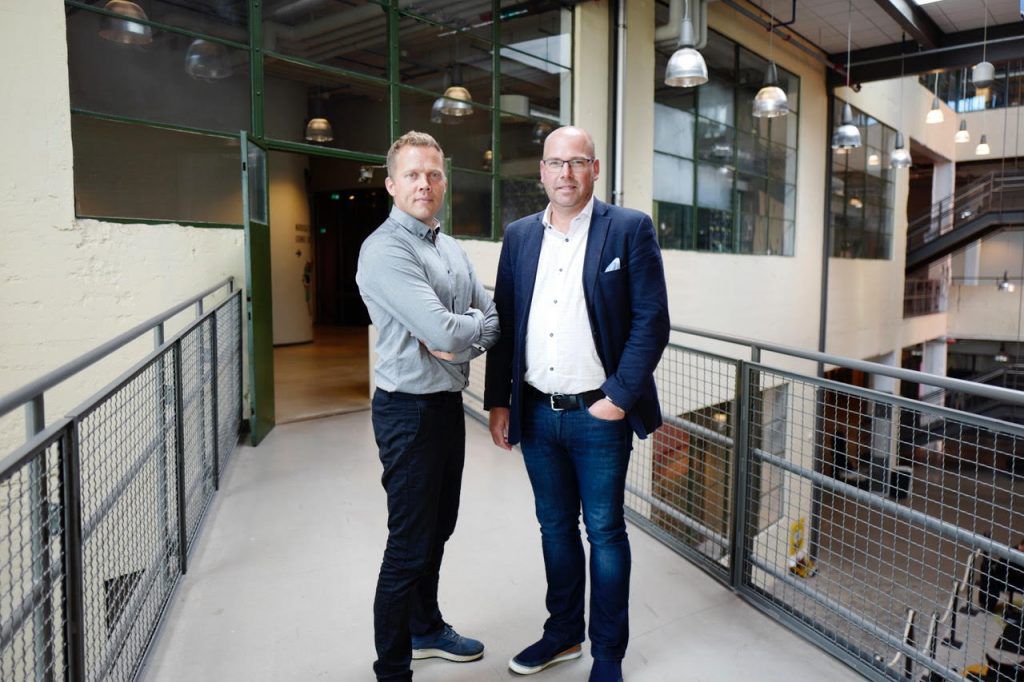
*Ekkonian – Person working at Ekkono